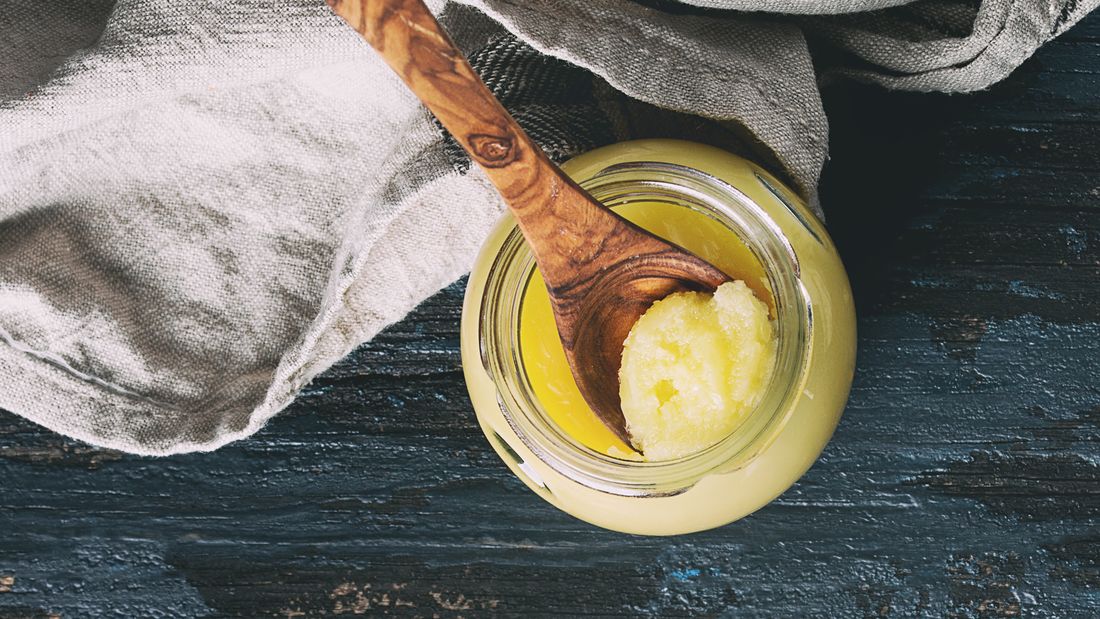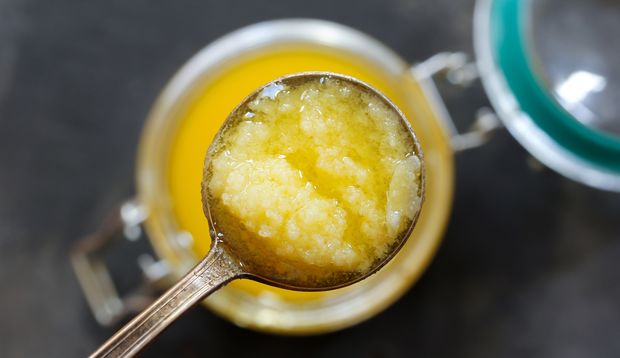So healthy is the butter alternative ghee

Ghee is said to work wonders. But what is hidden behind the fat with the exotic name? Three reasons why you should trade butter for ghee.
It comes from the Indian or Pakistani kitchen and is considered in the Far Eastern medicine as the miracle cure par excellence. Ghee (pronounced: ghi) is not only supposed to be healthier than butter, but also detoxifying and rejuvenating.
But what exactly is ghee? What is the difference to butter? And what are its real health effects? We asked the ecotrophologist Dr. Heike Niemeier and the Ayurveda and nutritional physician Dr. Müller-Leisgang from the Ayurveda Institute Munich. She even told us her secret recipe for the self-made variant.

What is ghee?
Behind the exotic name is something that everyone knows: Ghee is nothing more than clarified butter and is therefore also known as clarified butter or clarified butter.
In this respect, the term "butter alternative" is not quite correct, but there is a decisive difference. "Ghee is made from pure, unsalted butter and, after the clarification process, no longer contains milk proteins or lactose," explains the Ayurveda expert. ""Ideally, all the water from the butter is also evaporated.""
Where can I buy ghee?
Today, you can buy the clarified butter in any well-assorted supermarket, organic food store or online.
Is ghee healthier than butter?
If you compare ghee and butter, there are hardly any health differences. Both foods contain a high proportion of saturated fatty acids. But: Due to the absence of milk proteins, ghee is actually better digestible for many people and can therefore be absorbed faster by the body through the bloodstream. Ghee also has a higher proportion of butyric acid than butter, which has anti-inflammatory properties. Therefore it is worth replacing butter with ghee.
- ghee can be heated more than butter
High temperatures can't harm ghee. On the contrary: Ghee has its smoke point at 205 degrees. "This makes it possible to fry ghee very well without producing trans fatty acids," explains Dr. Heike Niemeier. Butter, on the other hand, starts to burn at around 175 degrees. The water evaporates, it splashes and hazardous substances such as acrylamide can be produced. - ghee protects your heart
A study with 206 healthy volunteers has shown that the consumption of ghee can have a positive effect on heart health. Ghee stimulates the synthesis of the protein ApoA, which plays a role in the formation of HDL cholesterol. However, you should not exceed our ghee consumption recommendation of one teaspoon per day.
Good to know: HDL cholesterol is also called "good cholesterol" because it protects against arteriosclerosis
"Ghee does not form free radicals in the cells," said Dr. Müller-Leisgang. Fortunately, because the reactive oxygen compounds are quite destructive. They promote diseases, weaken your immune system and let your cells - and thus your skin - age faster.
- ghee is easily digestible and lactose-free
"When the butter melts, the milk protein is partially washed out and the milk sugar, i.e. lactose, is completely washed out," says ecotrophologist Niemeier. This process makes the butter alternative more digestible for people with lactose intolerance.
How much ghee is healthy?
One thing is clear: for many people ghee is better digestible and therefore a great butter alternative for allergy sufferers. It provides some vitamins and minerals, but this part is relatively small. "One should also not forget that ghee consists almost exclusively of pure fat and is a high energy supplier," says Dr. Niemeier. Per tablespoon the butter substitute comes to 112 calories. Therefore ghee, just like butter, should be enjoyed in moderation.
"It should not exceed 20 grams per day," emphasizes Dr. Niemeier. ""The daily requirement of fat should be covered mainly by oils, such as olive or rapeseed oil."" explains Dr. Heike Niemeier.
Our tip: Combine ghee with a protein and carbohydrate source. This is the best way to stabilise your blood sugar level and stay full longer!
Is ghee healthier than oil?
"Although ghee has some health-promoting properties, it should not replace other valuable fats and oils," explains our nutritionist. Above all, people whose cholesterol levels are already high should only eat ghee and butter in moderation.
For a complete diet that provides your body with all the building blocks, Dr. Niemeier recommends fat sources of natural origin: "A combination of olive and rapeseed oil provides us with essential fatty acids such as omega-3 and omega-6 as well as fat-soluble vitamins that the body cannot produce itself. Above all, these contribute to healthy heart function and make your skin glow.
How is ghee used?
Ghee is a real all-round talent in the kitchen and is suitable for both cooking and baking as a butter substitute. It is especially suitable for frying due to its high heat resistance. Use a teaspoon of ghee instead of butter. It can also replace butter or margarine when baking. Ideal if you are looking for a lactose-free alternative.
How is ghee made?
The basic ingredient for ghee is butter. "Ghee is easy to make," says Dr. Müller-Leisgang. Home-made ghee is much cheaper than bought ghee. To make sure nothing goes wrong with ghee production, Dr. Müller-Leisgang told us her basic recipe for ghee. You only need butter and a pot.
Basic Recipe: How to make ghee yourself
Melt 4 sachets of organic sour cream butter in a large pot on the lowest flame. You shouldn't skimp on the quality of the butter, because it affects the final product and should therefore be organic.
Observe the liquid butter well, but do not stir. Slowly the butter clarifies, the milk protein settles on the bottom of the pot and the water evaporates. The foam that initially forms dissolves again.
After about 30 minutes the ghee has turned a golden yellow colour and you can see through it as if through water. The protein deposited at the bottom of the pot is hazelnut brown, the smell is similar to butter. Then you pour it off through a fine cotton cloth - that's it!
The expert has another tip: "The more butter you clear at once, the better the clarified butter will be afterwards." And it's worth it, because the butter alternative lasts a few months without any problems. ""The longer it boils, the longer it lasts. But it should not be kept in the refrigerator, because this could cause condensation in the glass and the ghee could go mouldy."
Compared to butter, ghee has certain advantages that can benefit you and your health. Why not give the Ayurvedic panacea a chance in the kitchen and try it out!